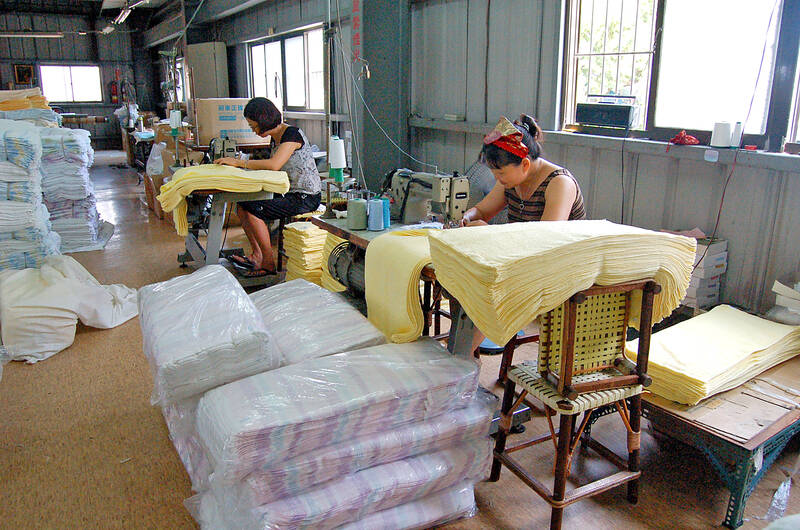The Ministry of Finance is extending its anti-dumping tariffs on toweling products from China for five years, as exporters continue to sell their goods at unfairly low prices in Taiwan, harming the local industry, it said last week.
The Customs Administration extended the anti-dumping tariffs of 29.72 percent on bath towels, pillow covers, napkins, tablecloths, footpads and semi-finished products sold by Chinese exporters, the ministry said in a statement on Friday.
The extension of the punitive tariffs, which were in effect from Dec. 21, 2017, to Dec. 20, 2022, started on Friday last week and are to run through Dec. 28, 2028, the agency said.

Photo: Liao Shu-ling, Taipei Times
The decision to extend the tariffs came after the ministry completed a third sunset investigation into the trading practices of Chinese exporters of toweling products, it said.
It and the Ministry of Economic Affairs agree the materially adverse effects that Chinese towel exporters’ unfair practices have had on Taiwan’s towel industry has not ended.
There is no evidence that the continued anti-dumping tariffs would have a negative effect on Taiwan’s economy, the Ministry of Finance said.
It imposed anti-dumping tariffs on China-made toweling products for the first time in June 1, 2006, with the tariff set at 204.1 percent for five years.
After its first sunset investigation in 2011, the ministry extended the tariff for another five years to Dec. 19, 2016.
Following the second sunset probe, it reinstated the tariff again for five years, but reduced it to 29.72 percent.
Over the 10 years to the end of November last year, Taiwan collected more than NT$103 million (US$3.34 million) in anti-dumping taxes from Chinese towel exporters, finance ministry data showed.
However, the tariff failed to reduce imports of toweling products from China over the past five years.
In the first 11 months of last year, imports of toweling product from China topped NT$21 million, up from about NT$6 million in 2019, the data showed.

RUN IT BACK: A succesful first project working with hyperscalers to design chips encouraged MediaTek to start a second project, aiming to hit stride in 2028 MediaTek Inc (聯發科), the world’s biggest smartphone chip supplier, yesterday said it is engaging a second hyperscaler to help design artificial intelligence (AI) accelerators used in data centers following a similar project expected to generate revenue streams soon. The first AI accelerator project is to bring in US$1 billion revenue next year and several billion US dollars more in 2027, MediaTek chief executive officer Rick Tsai (蔡力行) told a virtual investor conference yesterday. The second AI accelerator project is expected to contribute to revenue beginning in 2028, Tsai said. MediaTek yesterday raised its revenue forecast for the global AI accelerator used

TEMPORARY TRUCE: China has made concessions to ease rare earth trade controls, among others, while Washington holds fire on a 100% tariff on all Chinese goods China is effectively suspending implementation of additional export controls on rare earth metals and terminating investigations targeting US companies in the semiconductor supply chain, the White House announced. The White House on Saturday issued a fact sheet outlining some details of the trade pact agreed to earlier in the week by US President Donald Trump and Chinese President Xi Jinping (習近平) that aimed to ease tensions between the world’s two largest economies. Under the deal, China is to issue general licenses valid for exports of rare earths, gallium, germanium, antimony and graphite “for the benefit of US end users and their suppliers

Dutch chipmaker Nexperia BV’s China unit yesterday said that it had established sufficient inventories of finished goods and works-in-progress, and that its supply chain remained secure and stable after its parent halted wafer supplies. The Dutch company suspended supplies of wafers to its Chinese assembly plant a week ago, calling it “a direct consequence of the local management’s recent failure to comply with the agreed contractual payment terms,” Reuters reported on Friday last week. Its China unit called Nexperia’s suspension “unilateral” and “extremely irresponsible,” adding that the Dutch parent’s claim about contractual payment was “misleading and highly deceptive,” according to a statement

Artificial intelligence (AI) giant Nvidia Corp’s most advanced chips would be reserved for US companies and kept out of China and other countries, US President Donald Trump said. During an interview that aired on Sunday on CBS’ 60 Minutes program and in comments to reporters aboard Air Force One, Trump said only US customers should have access to the top-end Blackwell chips offered by Nvidia, the world’s most valuable company by market capitalization. “The most advanced, we will not let anybody have them other than the United States,” he told CBS, echoing remarks made earlier to reporters as he returned to Washington